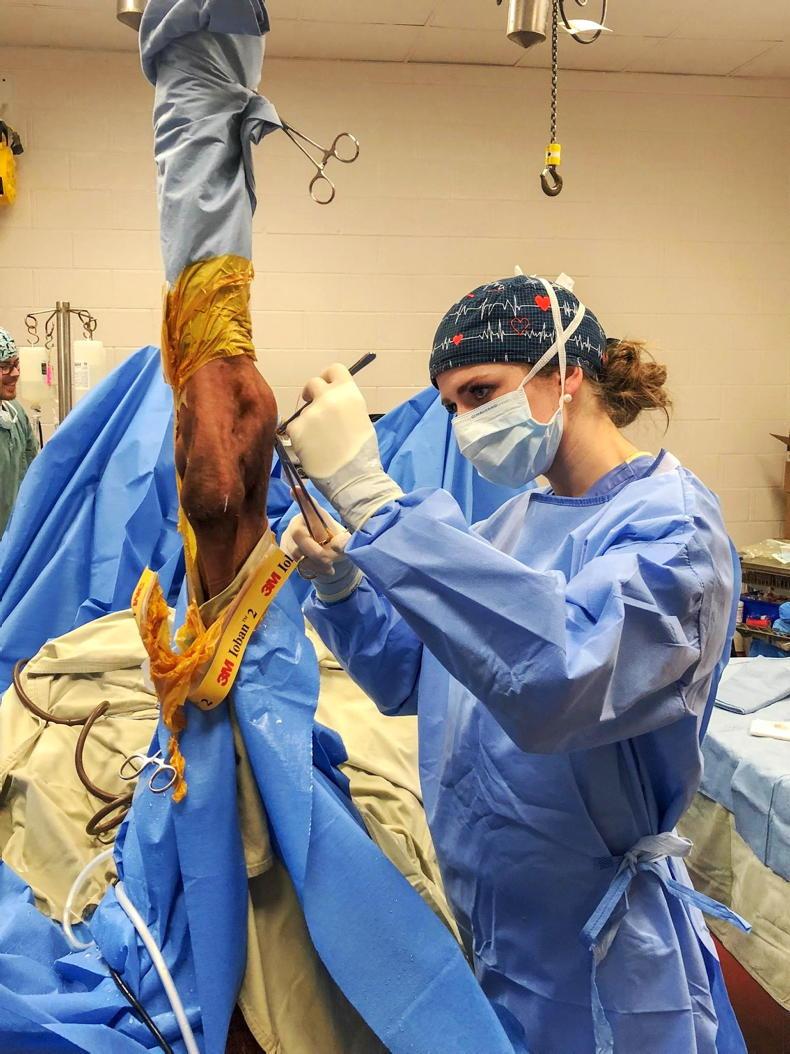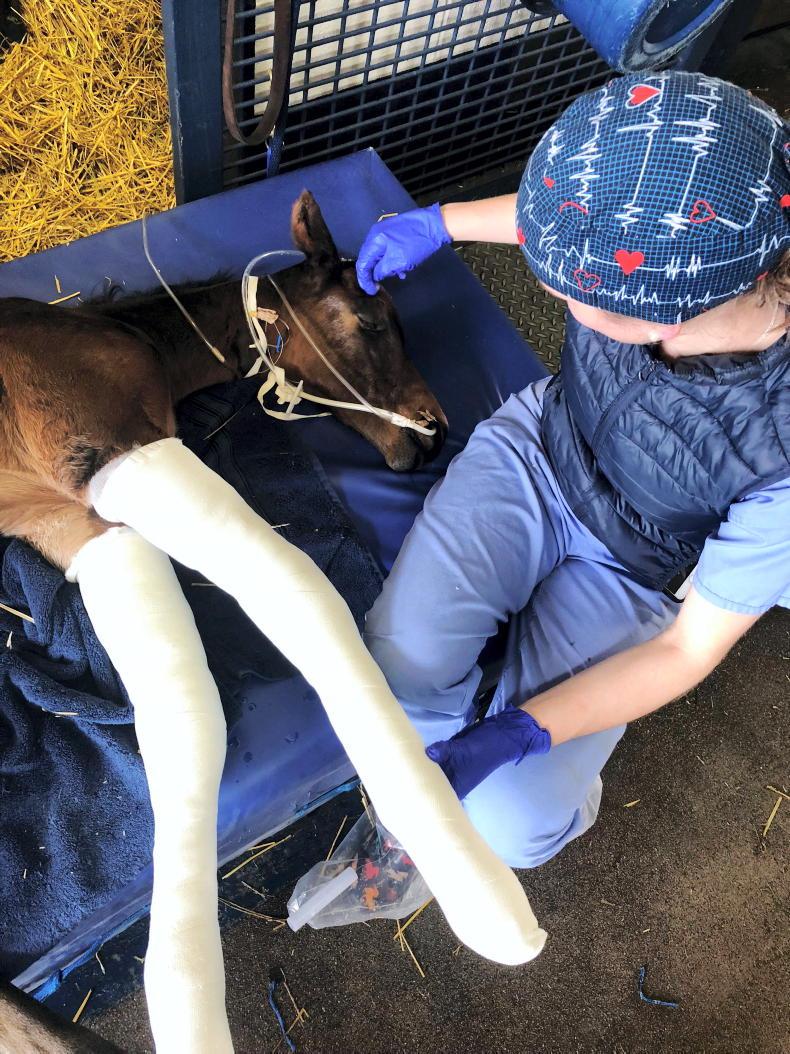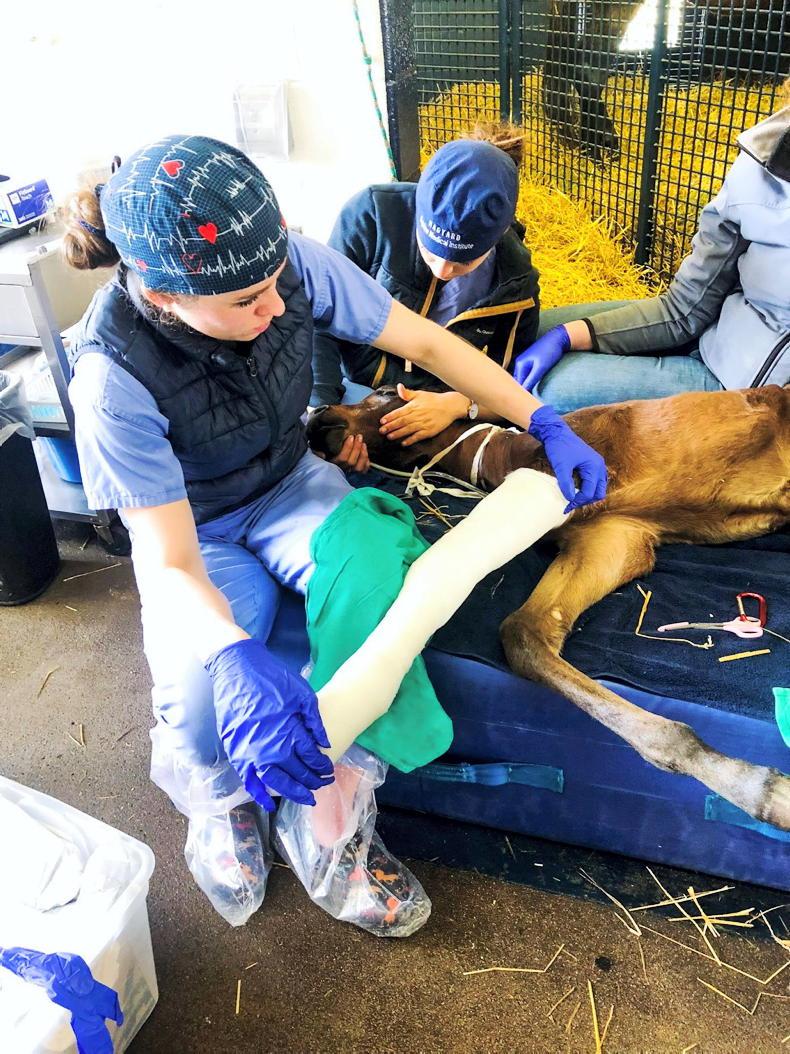Veterinarian Dr Orla McGlynn DVM MRCVS BSc from Inch Island in Co Donegal was only 16 when she completed her Leaving Certificate. We asked her a few questions about her journey to become a vet.
Helen Sharp: How long did it take you to qualify as a vet?
Orla McGlynn: Growing up on a farm, I always loved the veterinary aspect of things. I went at 16 to study Equine Management at the College of Agriculture, Food and Rural Enterprise (CAFRE) and graduated at 19. While studying I began working for the late Ronnie Smith (a top international showjumper in his day) and there I got to work with the horses alongside his son, respected equine vet Eric Smith. Ronnie used to say: “You can do anything you put your mind to if you want it bad enough; never let money get in the way of doing anything, because where there is a will, there is a way!”
It took five and a half years to become a vet. I did five years studying in Budapest and I did six months of placements between the UK, Ireland and America and graduated in 2018.
Where has your veterinary work taken you and can you give an example of the kind of work you do?
As well as studying in Budapest I completed an equine surgical internship in Kentucky. I still work for an American company doing pre-purchase examinations on thoroughbreds and so I’ve been back to Kentucky, to Deauville in France, Tattersalls in the UK, Goffs here in Ireland and my next sale will be Maryland, Florida this year.
At the pre-sale exams, I travel to the sale venue where I am given a list of horse lot/hip numbers. I go to the repository [a room strictly for veterinarians to access the radiograph images taken before the sale and uploaded to a secure server] where I read the radiographs, and watch an endoscope video of the horse’s upper airway or we perform an endoscope while doing the physical exam on the horse. [An endoscope is a special camera that helps vets see otherwise inaccessible areas of the equine respiratory tract, eg pharynx, larynx, guttural pouches and trachea. Using the portable fibre optic endoscope, these regions can be seen in great detail.]
During the physical exam, we check for any obvious conformation defects or abnormalities that may hinder performance and any signs of neurological disorder and check the heart and eyes.
Vets have notoriously long hours and callouts in the middle of the night; what are your tips for dealing with that?
Some people will laugh, but actually, I love the calls at night to large animals. I love the adrenaline of emergencies and seeing how grateful the people are for your help. The breeding season in spring is my favourite time of year. Yes, you do become sleep deprived, but I think ensuring some physical exercise every day, plenty of caffeine and listening to music or a podcast when driving really helps!
How do you cope with the loss of animals?
Sometimes I try to find comfort in the thought that I’m ending that animal’s suffering. I also try to be as compassionate as I can towards the owners and the animals, and if I can provide comfort to either or both, then it helps.
What are your dreams and ambitions?
To continue my career in such a way that I wake up every day, or at least most days, excited to go to work. I hope I never lose my desire to gain knowledge and grow my skill set. I’d also like to compete in a show jumping Grand Prix, preferably abroad!
Being a vet is a tough job; why do you do it and what area of veterinary do you enjoy the most?
Every day is different. I get great satisfaction from helping and educating people and ensuring their animals are kept happy and healthy. I think the question of what area I enjoy most is the most difficult to answer. Variety is the spice of life. I love a good challenge, and I enjoy learning new things. I enjoy a good medicine workup, but I’m the first to go to a lambing; I enjoy caesarean and a stitch-up as much as finding the source of a lameness. Horses are my passion, but so far, I’ve found it too early in my career to specialise in equine as I still want to experience it all.
What was the best advice you were ever given and would pass on to anyone thinking of studying to become a vet?
If you’re doing it for the money, then don’t bother!
Read more
College not your thing? Check out these hot apprenticeships for 2022
Epic ambition
Veterinarian Dr Orla McGlynn DVM MRCVS BSc from Inch Island in Co Donegal was only 16 when she completed her Leaving Certificate. We asked her a few questions about her journey to become a vet.
Helen Sharp: How long did it take you to qualify as a vet?
Orla McGlynn: Growing up on a farm, I always loved the veterinary aspect of things. I went at 16 to study Equine Management at the College of Agriculture, Food and Rural Enterprise (CAFRE) and graduated at 19. While studying I began working for the late Ronnie Smith (a top international showjumper in his day) and there I got to work with the horses alongside his son, respected equine vet Eric Smith. Ronnie used to say: “You can do anything you put your mind to if you want it bad enough; never let money get in the way of doing anything, because where there is a will, there is a way!”
It took five and a half years to become a vet. I did five years studying in Budapest and I did six months of placements between the UK, Ireland and America and graduated in 2018.
Where has your veterinary work taken you and can you give an example of the kind of work you do?
As well as studying in Budapest I completed an equine surgical internship in Kentucky. I still work for an American company doing pre-purchase examinations on thoroughbreds and so I’ve been back to Kentucky, to Deauville in France, Tattersalls in the UK, Goffs here in Ireland and my next sale will be Maryland, Florida this year.
At the pre-sale exams, I travel to the sale venue where I am given a list of horse lot/hip numbers. I go to the repository [a room strictly for veterinarians to access the radiograph images taken before the sale and uploaded to a secure server] where I read the radiographs, and watch an endoscope video of the horse’s upper airway or we perform an endoscope while doing the physical exam on the horse. [An endoscope is a special camera that helps vets see otherwise inaccessible areas of the equine respiratory tract, eg pharynx, larynx, guttural pouches and trachea. Using the portable fibre optic endoscope, these regions can be seen in great detail.]
During the physical exam, we check for any obvious conformation defects or abnormalities that may hinder performance and any signs of neurological disorder and check the heart and eyes.
Vets have notoriously long hours and callouts in the middle of the night; what are your tips for dealing with that?
Some people will laugh, but actually, I love the calls at night to large animals. I love the adrenaline of emergencies and seeing how grateful the people are for your help. The breeding season in spring is my favourite time of year. Yes, you do become sleep deprived, but I think ensuring some physical exercise every day, plenty of caffeine and listening to music or a podcast when driving really helps!
How do you cope with the loss of animals?
Sometimes I try to find comfort in the thought that I’m ending that animal’s suffering. I also try to be as compassionate as I can towards the owners and the animals, and if I can provide comfort to either or both, then it helps.
What are your dreams and ambitions?
To continue my career in such a way that I wake up every day, or at least most days, excited to go to work. I hope I never lose my desire to gain knowledge and grow my skill set. I’d also like to compete in a show jumping Grand Prix, preferably abroad!
Being a vet is a tough job; why do you do it and what area of veterinary do you enjoy the most?
Every day is different. I get great satisfaction from helping and educating people and ensuring their animals are kept happy and healthy. I think the question of what area I enjoy most is the most difficult to answer. Variety is the spice of life. I love a good challenge, and I enjoy learning new things. I enjoy a good medicine workup, but I’m the first to go to a lambing; I enjoy caesarean and a stitch-up as much as finding the source of a lameness. Horses are my passion, but so far, I’ve found it too early in my career to specialise in equine as I still want to experience it all.
What was the best advice you were ever given and would pass on to anyone thinking of studying to become a vet?
If you’re doing it for the money, then don’t bother!
Read more
College not your thing? Check out these hot apprenticeships for 2022
Epic ambition






 This is a subscriber-only article
This is a subscriber-only article













SHARING OPTIONS: